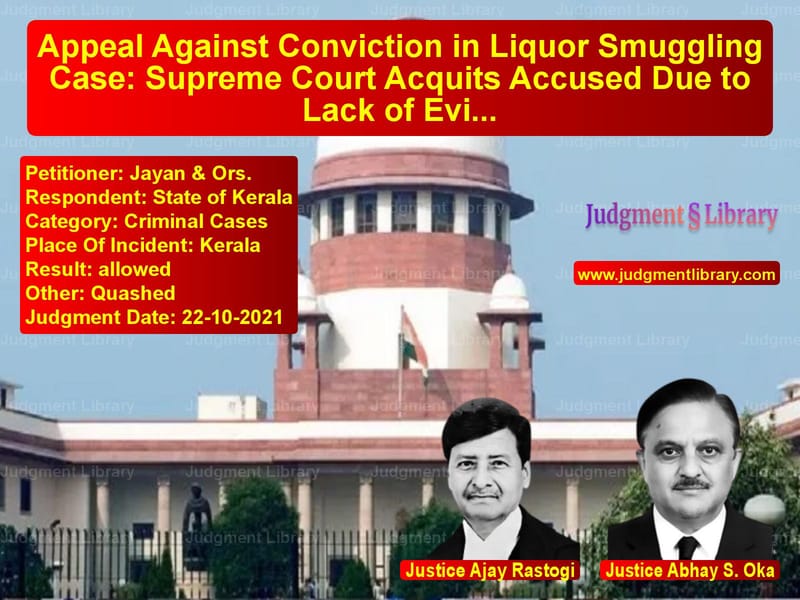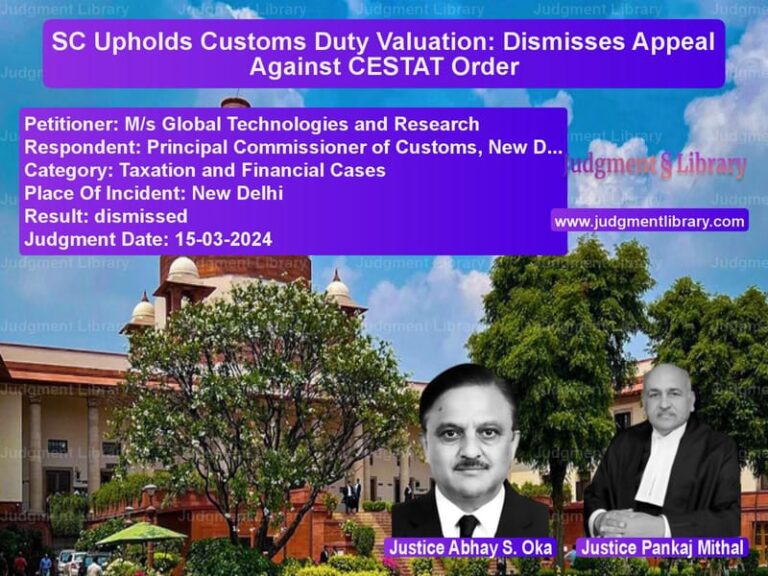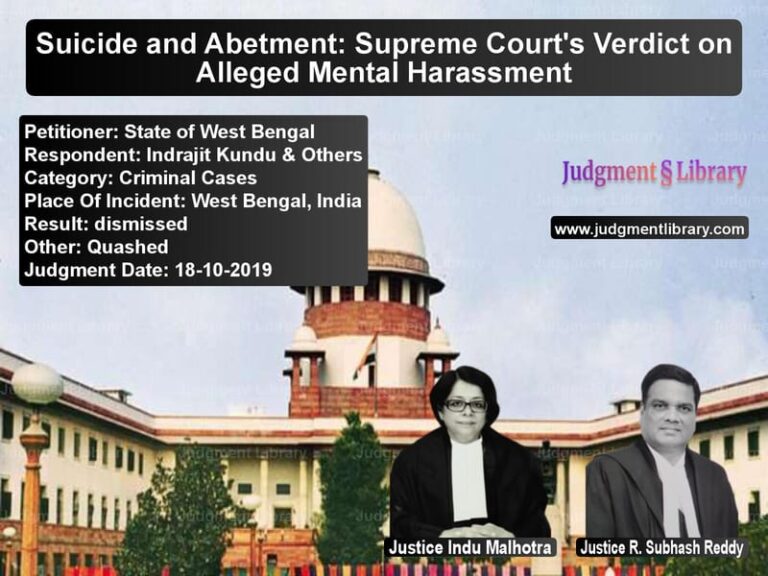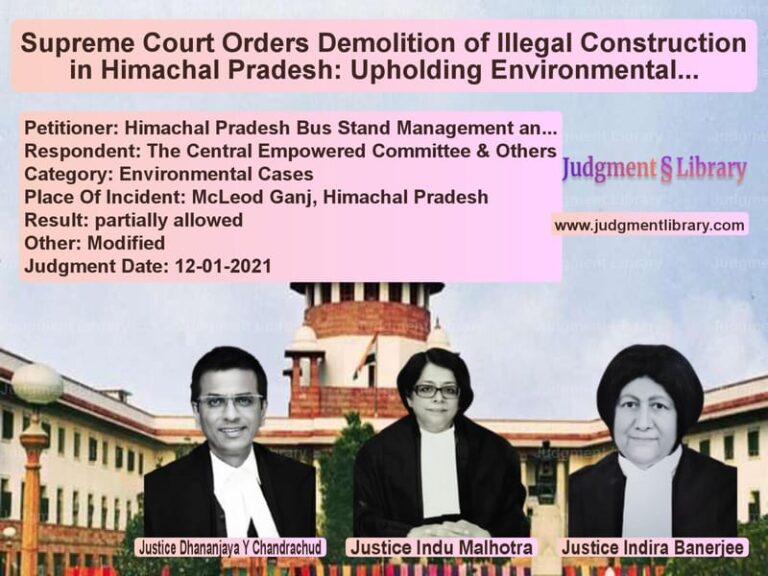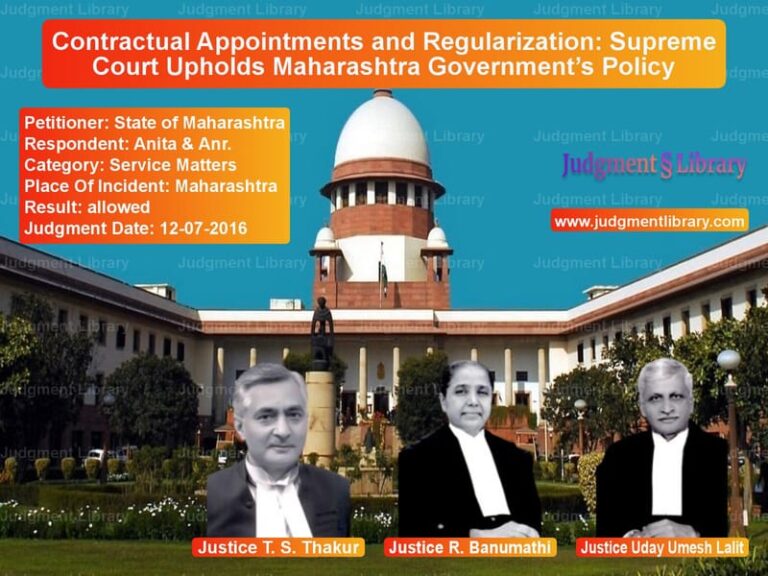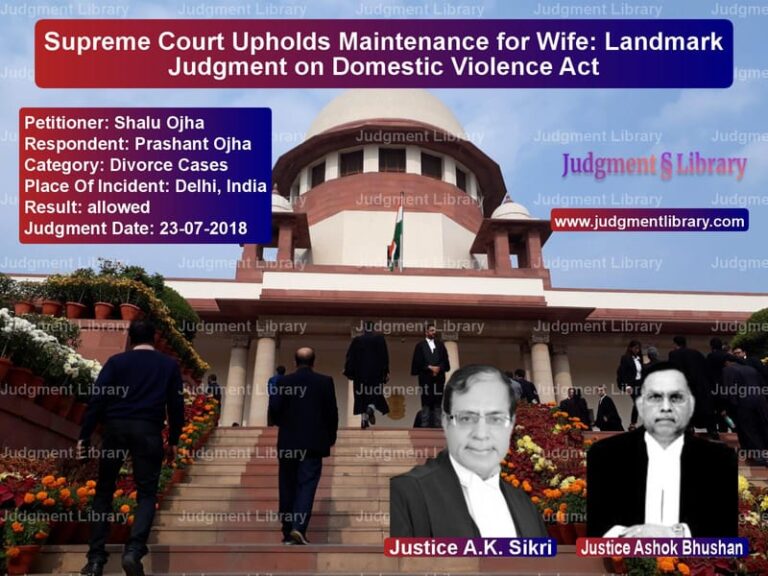Appeal Against Conviction in Liquor Smuggling Case: Supreme Court Acquits Accused Due to Lack of Evidence
The Supreme Court of India, in the case of Jayan & Ors. vs. State of Kerala, addressed a significant matter involving the alleged illegal transportation of spirit under the Kerala Abkari Act. The accused were convicted for the offence of transporting a large quantity of spirit in violation of the Act. However, upon appeal, the Supreme Court quashed the conviction and acquitted the appellants due to lack of sufficient evidence, highlighting several key procedural flaws in the prosecution’s case.
Background of the Case
The case revolves around the illegal transportation of 6090 litres of spirit in 174 plastic cans, which was being transported by the accused in a truck. The truck was stopped at the Mandapathin Kadavu check post in Kerala on July 25, 1999, by authorities for inspection. However, the driver, accused No.2, attempted to flee the scene, damaging the check post barricade in the process. The truck was subsequently apprehended, and upon inspection, it was discovered that the truck was carrying a large quantity of spirit, which was not accompanied by the necessary licenses or permits under the Abkari Act.
The prosecution’s case was that the truck, bearing registration number KLB-7589, was being used to transport the spirit illegally. It was alleged that the accused No.1 was the owner of the truck, and the other accused, including No.2 and No.4, were involved in the smuggling operation. The prosecution based its case on witness testimonies, including an alleged confession by accused No.2, and evidence found at the scene of the incident.
Despite the charge, the prosecution could not conclusively prove the ownership of the truck or the identity of the registered owner of the vehicle. The primary evidence was based on the testimonies of the police officers and the alleged confession of accused No.2, which the defense contended was inadmissible.
Arguments Before the Court
Appellant’s (Jayan and Others) Arguments:
- The conviction was based primarily on the testimony of a police officer and the alleged confession of accused No.2, which was made under duress and cannot be considered reliable evidence.
- No conclusive evidence was presented to establish that the accused owned the truck or that they were involved in the smuggling of the spirit. The ownership of the truck was never conclusively proven as the prosecution failed to produce relevant documentation from the Regional Transport Office (RTO).
- The prosecution did not investigate the engine and chassis number of the truck, which could have proven the true registration details of the vehicle.
- Several crucial witnesses, including those who could have shed light on the ownership of the truck, were not examined.
- There was a significant delay in identifying the accused and linking them to the smuggling operation, particularly with regard to witness identification, which further undermines the reliability of the case.
Respondent’s (State of Kerala) Arguments:
- The respondent argued that the evidence presented in the form of the truck’s seizure, the large quantity of spirit found, and the statement made by accused No.2 regarding the ownership of the truck was sufficient to sustain the conviction.
- The respondent contended that the lack of the official registration document was not significant, as the witnesses had identified the accused, and there was ample circumstantial evidence linking them to the crime.
- The absence of a Test Identification Parade (TIP) did not negate the identification made by the prosecution witnesses in court.
Supreme Court’s Ruling
The Supreme Court, after considering the evidence and the submissions made by both parties, quashed the conviction and acquitted the accused. The Court highlighted the following key points:
On the Reliability of the Confession:
The Court emphasized that the alleged confession made by accused No.2 was inadmissible, as it was made to a police officer and was not voluntary. The Court stated:
“Confessions made to police officers are not admissible in evidence under Section 25 of the Evidence Act, unless they are made in the presence of a Magistrate. Therefore, the confessional statement made by accused No.2 cannot be relied upon to establish the guilt of the accused.”
On the Lack of Documentary Evidence:
The Court found that the prosecution had failed to produce vital evidence, particularly the official registration documents from the RTO and other documents that could have conclusively proven the ownership of the truck. The Court observed:
“The prosecution did not produce the RTO records to confirm the ownership of the truck. Furthermore, the photocopy of the R.C. book found in the truck was not produced in court. Without the necessary documentary evidence to prove ownership, the charges against the accused cannot be substantiated.”
On Witness Identification and Procedural Issues:
The Court pointed out the substantial issues with witness identification and the delayed testimony of some prosecution witnesses. The Court concluded:
“The identification of the accused in court after a long period of time, without conducting a Test Identification Parade (TIP), significantly undermines the credibility of the witness testimony.”
Furthermore, the Court noted that many key witnesses were not examined, and the testimony of those who were examined was inconsistent and lacked corroboration.
On the Lack of Investigation into the Truck’s Ownership:
The Court found that the prosecution failed to investigate the truck’s ownership adequately. The Court noted that the failure to verify the engine and chassis numbers and the absence of a clear investigation into the truck’s registration were significant lapses in the case:
“The prosecution’s failure to investigate the engine and chassis numbers of the truck, and the lack of documentary evidence linking the truck to the accused, has led to the collapse of the case against the accused.”
Impact of the Judgment
This judgment has important implications for criminal law, particularly in cases involving circumstantial and testimonial evidence:
- The ruling reinforces the principle that confessions made to police officers are not admissible in evidence unless made before a Magistrate.
- The judgment highlights the importance of proper documentation and investigation in criminal cases, particularly when the identity of the accused and the ownership of the property involved are in question.
- It underscores the need for consistent and corroborated witness testimony, particularly in cases where identification of the accused is crucial to the case.
Conclusion
The Supreme Court’s ruling in Jayan vs. State of Kerala has established important precedents regarding the admissibility of evidence in criminal cases. By quashing the conviction of the accused, the Court has reaffirmed the importance of adhering to procedural requirements, including proper documentation and the need for corroborative evidence. The judgment serves as a reminder of the need for transparency and thorough investigation in criminal trials, particularly in cases involving serious allegations such as smuggling and transportation of illegal substances.
Petitioner Name: Jayan & Ors..Respondent Name: State of Kerala.Judgment By: Justice Ajay Rastogi, Justice Abhay S. Oka.Place Of Incident: Kerala.Judgment Date: 22-10-2021.
Don’t miss out on the full details! Download the complete judgment in PDF format below and gain valuable insights instantly!
Download Judgment: jayan-&-ors.-vs-state-of-kerala-supreme-court-of-india-judgment-dated-22-10-2021.pdf
Directly Download Judgment: Directly download this Judgment
See all petitions in Fraud and Forgery
See all petitions in Terrorist Activities
See all petitions in Money Laundering Cases
See all petitions in Judgment by Ajay Rastogi
See all petitions in Judgment by Abhay S. Oka
See all petitions in allowed
See all petitions in Quashed
See all petitions in supreme court of India judgments October 2021
See all petitions in 2021 judgments
See all posts in Criminal Cases Category
See all allowed petitions in Criminal Cases Category
See all Dismissed petitions in Criminal Cases Category
See all partially allowed petitions in Criminal Cases Category

